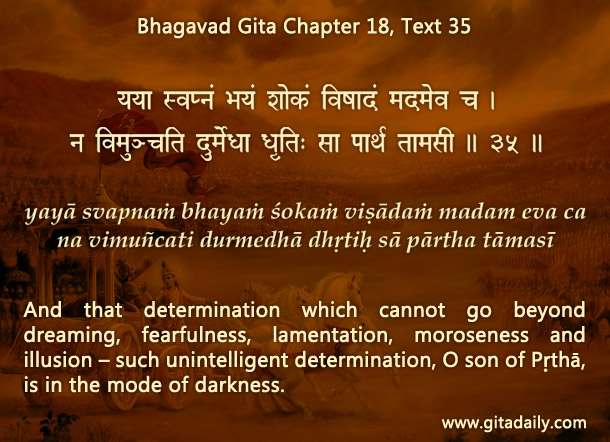Suppose something is stinking in our home. We will immediately find and remove it.
We need to do the same when our thinking starts stinking. That is, our thoughts radiate such negativity that people find being with us unbearable or even we find being alone with our thoughts unbearable. Such thinking characterizes those steeped in ignorance (Bhagavad-gita 18.35).
Why does our thinking start stinking? Because we pander indiscriminately to our mind.
By default, our mind craves for various enjoyable material things and carps about their unavailability. If we start dwelling on whatever the mind is thinking, we soon become consumed by craving and carping. And as most of the mind’s cravings are unfulfillable, we end up resenting, blaming, moping. We rail at the world, at people or at ourselves: “The world is cruel; people are backstabbers; we are hopeless.” When our very thinking makes us miserable, we can know that our thinking is stinking. Unfortunately, our mind misleads us further by making us frantically slave to fix whatever it is railing about.
Instead of seeking outer fixes, we need to first remove the inner stink. How? By challenging our mind’s conception of what is enjoyable. For issuing such a challenge, Gita wisdom equips us with knowledge about the way to real happiness. We are at our core souls who can rejoice eternally by connecting with the supreme spiritual reality, all-attractive Krishna.
Understanding that we don’t need worldly things to be happy, we stop entertaining the mind’s constant craving and carping. When we practice bhakti-yoga to connect with Krishna, the resulting satisfaction gives us the experiential conviction to reject the mind’s conception of enjoyment. And by steady bhakti-yoga practice, when we become attached to Krishna and he becomes the home of our thoughts, our thinking itself starts becoming thrilling (18.77).
Think it over:
- What does stinking thinking mean?
- How does our thinking start stinking?
- How can we change our mind’s conception of enjoyment?
***
18.35 And that determination which cannot go beyond dreaming, fearfulness, lamentation, moroseness and illusion – such unintelligent determination, O son of Prutha, is in the mode of darkness.
To know more about this verse, please click on the image
Explanation of article:
Podcast:


To be happy,mind your mind